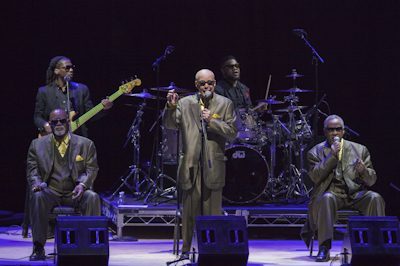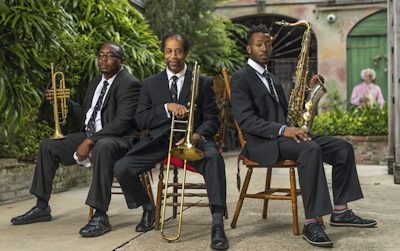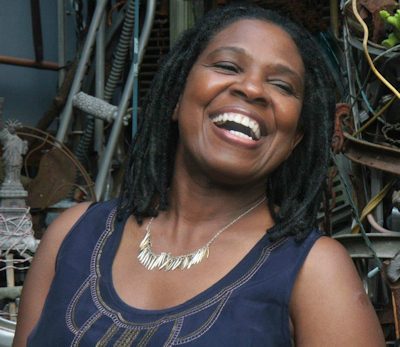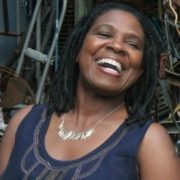THE BLIND BOYS OF ALABAMA
THE BLIND BOYS OF ALABAMA
Christmas Show at The Theatre at Ace Hotel Sunday, December 17, 2017
Presented by CAP-UCLA
Featuring Preservation Hall Legacy Horns and Ruthie Foster!
Old Time Religion

“I still have a dream that one day down in Alabama—with its vicious racists…
A state sweltering with the heat of oppression—the sons of former slaves and the sons of former slave owners will be able to sit down together at the table of brotherhood…”
~MLK~ I Have a Dream; August 28, 1963
Eighteen days after Dr. King gave the most inspiring speech of the civil rights movement four members of the Ku Klux Klan bombed the 16th Street Baptist Church in Birmingham, Alabama and killed four young black girls who were attending choir practice that morning. What has that to do with the Blind Boys of Alabama? Nothing; and everything: their concert dovetailed with a lot that’s been on my mind this past week.
At a time when the Pope is campaigning for revising the King James version of the Lord’s Prayer in keeping with some higher notion of Greek or Aramaic syntax—and the President is campaigning for a sexual predator for the United States Senate—where do you go for a healthy dose of that old time religion? Our Father who art in Heaven—hallowed be Thy name—Thy Kingdom come, Thy will be done on earth as it is in Heaven; led me not into temptation, but rather delivered me and Jill Fenimore to the Theatre at Ace Hotel in downtown Los Angeles for the Christmas Show of a lifetime by the Blind Boys of Alabama—with the Preservation Hall Legacy Horns and Ruthie Foster.
They may not have made a believer out of contemporary atheists Richard Dawkins or the late Christopher Hitchens, or the late great Clarence Darrow, but they may well have made a believer out of Charles Darwin, who wrote a recently unearthed compassionate letter to a young English boy disturbed by the heretical implications of Darwin’s On the Origin of Species: “The strongest argument for the existence of God, as it seems to me, is the instinct or intuition which we all (as I suppose) feel that there must have been an intelligent beginner of the Universe, but then comes the doubt and difficulty whether such intuitions are trustworthy.
“I have touched on one point of difficulty in the two last pages of my “Variations of Animals and Plants under Domestication,” but I am forced to leave the problem insoluble. No man who does his duty has anything to fear, and may hope for whatever he earnestly desires.”
Dear Sir,
Yours faithfully,
Ch. Darwin
If it’s good enough for Darwin, it’s good enough for me.
Imagine if the Blind Boys of Alabama had done their annual Christmas Show at the Theatre at the Ace Hotel knowing that Alabama had just elected a child molester to the United States Senate—with the full support and endorsement of the US president. But praise Jesus it didn’t happen! There is a New Alabama afoot—one that is no longer “sweltering with the heat of oppression,” as Dr. King put it, and it certainly contributed to the Joy to the World atmosphere of their great celebration of Christmas last night. If you think Bing Crosby is what White Christmas is all about~ let me tell you something: you’ve never heard the song until you’ve heard The Blind Boys of Alabama render it into a full bore gospel celebration of everything Christmas—not just white—but rich dark black chocolate too—and a number of colors in between. Somewhere Irving Berlin is smiling—and the stars around him are twinkling in response. It was a sumptuous feast of holiday cheer—with layers of soul and jazz and blues for good measure.
Democratic Senator-elect Doug Jones won by some 20,000 votes—but I counted 20,004 votes—the final four votes represented the four black girls who were murdered in the 16th Street Baptist Church bombing by four Ku Klux Klan members on September 15, 1963. For it was Doug Jones as then US Attorney of the Northern District of Alabama—appointed by President Bill Clinton in 1997—who successfully prosecuted the two remaining Klan members Thomas Edwin Blanton and Bobby Frank Cherry in 2001 and 2 for their roles in the bombing murder of the four black girls folk singer Richard Farina memorialized in his song Birmingham Sunday—Addie Mae Collins, Denise McNair, Cynthia Wesley, and Carol Robertson—“And the choirs kept singing of Freedom.” (source: Rise Up Singing, page 59.) Election Day December 12, 2018 (the same day Darwin’s letter was auctioned off at Sotheby’s) was Birmingham Tuesday to me.

The Blind Boys of Alabama were in their third decade of performing and worldwide touring then—having met in the late 1930s in the Alabama Institute for the Negro Blind. They met in the state that virtually symbolized racism in the Old South—for it was also Alabama where the notorious miscarriage of justice occurred in 1931 when nine black teenagers known as The Scottsboro Boys were arrested, tried and convicted in a series of trials that lasted until 1937 for the rape of two white Alabama women on-board a train near Scottsboro, Alabama—a case that became sensational in that it was about a crime that was almost unimaginable in its brutality. No wonder: The Scottsboro Boys were not only falsely accused—they were accused of a crime that never occurred. Lead Belly wrote a song about them, which appears on the album The Library Of Congress Recordings: Leadbelly – Let It Shine On Me, Vol. 3 (1991).and Lead Belly: The Centennial Recordings, a six CD set from Smithsonian Folkways (on Disk 1). Here is the opening verse/chorus:
Go to Alabama and ya better watch out
The landlord’ll get ya, gonna jump and shout
Scottsboro Scottsboro Scottsboro boys
Tell ya what it’s all about …
Only many years later were they finally exonerated and formally pardoned by both the Alabama State Legislature and Governor George Wallace. All during these decades of performing their redefined blend of Gospel, Blues and Soul as a kind of electric Gospel The Blind Boys of Alabama maintained their ties to the church while other gospel singers were seeking and finding secular fame in performing non-sacred music like Jerry Lee Lewis, Josh White and Little Richard. And yet the Blind Boys have included echoes of some of these sounds—with some riffs from The House of New Orleans (which Jill recognized); how lovely to hear it as an intro to Amazing Grace in the key of A Minor!
But underneath their rich musical heritage The Blind Boys of Alabama stuck to their gospel roots—even when it cost them financially and reduced the size of their potential audiences. Their commitment to religious music eventually won them back their original audience many times over—including five Grammys and a Lifetime Grammy for Distinguished Achievement from The National Academy of Recording Arts and Sciences (NARAS) and a Lifetime Achievement Award from the NEA. They are nominated for their sixth Grammy this time around—in Best Gospel Roots Performance for the song Let My Mother Live, on the album Almost Home—which founding surviving member Jimmy Carter (no relation) utterly charmed the audience by promoting for the first half hour of their show. (See FolkWorks listing of all Grammy Nominees.)
Their special accompanists for this amazing show were the Preservation Hall Legacy Horns—from the Preservation Hall Jazz Band, which first opened in the French Quarter of New Orleans in 1961. Since then it has become the definitive New Orleans Dixieland jazz band. This trio is comprised of Kevin Louis on trumpet; Freddie Lonzo, trombone; and Calvin Johnson, saxophone. They are a great trio together, but for this show we saw an extraordinary solo effort (and an effort it was) by slide trombonist Freddie Lonzo. At the end of their opening song Basin Street Blues he held the longest note I have ever heard—that went through various physical changes from his chair down to the floor in front of the stage on his back—and back again to his chair—to the microphone in front—wavering, quavering, suspended and never failing in its unbelievable demonstration of what a “wind instrument” means. It was a show-stopping several minutes that brought the crowd to its feet in thunderous applause. They followed that with the Christmas classic Let It Snow, with a wonderful sax solo by Calvin Johnson. Then they brought on the headliners.
Had it been anybody but the Blind Boys of Alabama it would have seemed anti-climactic to introduce them—but the Blind Boys were the main attraction everyone had come to see. They were impossible to upstage—so good they were—even impossible to imagine had you never seen them before, which we had not. There is nothing new under the sun? Well, the Blind Boys of Alabama are new—even though they are now 75 years old.
Who are they? Jimmy Carter/Vocals; Eric “Ricky” McKinnie/Vocals; Ben Moore/Vocals; Joey Williams/Vocals and Fender Strat Guitar; Austin Moore/Drums; Ray Ladson/Bass; and Matt Hopkins/Hammond B3 & Keyboards.
They performed my favorite Christmas spiritual of all—the title of James Baldwin’s first novel—Go Tell It On the Mountain in B Minor—which is also the title song of their Grammy-winning first Christmas album:
Go tell it on the mountain
Over the hills and everywhere
Go tell it on the mountain
That Jesus Christ is born.
 Along with their gospel-roof-raising version of Silent Night in D—which was anything but silent—one could not have asked for a more thrilling prelude to Christmas—except there was a grand finale that transcended the limits of any one song—even Silent Night—which they introduced with the full-throttle hands on gospel interlude of leader Jimmy Carter (one of only two original members from 1942—the same year Irving Berlin’s signature song White Christmas was introduced in the holiday classic Holiday Inn.) Carter—who has an indomitable voice that could cut through bark—suddenly left the stage and wound his way throughout the waiting and receptive audience, on both sides of the grand auditorium—a fully restored art deco masterpiece with the highest ceilings I have ever seen outside the Sistine Chapel—reaching his ancient weathered hands out to anyone who would shake them—as I gratefully did when he walked by our aisle seats.
Along with their gospel-roof-raising version of Silent Night in D—which was anything but silent—one could not have asked for a more thrilling prelude to Christmas—except there was a grand finale that transcended the limits of any one song—even Silent Night—which they introduced with the full-throttle hands on gospel interlude of leader Jimmy Carter (one of only two original members from 1942—the same year Irving Berlin’s signature song White Christmas was introduced in the holiday classic Holiday Inn.) Carter—who has an indomitable voice that could cut through bark—suddenly left the stage and wound his way throughout the waiting and receptive audience, on both sides of the grand auditorium—a fully restored art deco masterpiece with the highest ceilings I have ever seen outside the Sistine Chapel—reaching his ancient weathered hands out to anyone who would shake them—as I gratefully did when he walked by our aisle seats.
Being able literally to touch the garment of their lead singer who started out from the Alabama Institute for the Negro Blind the same year as the Scottsboro Boys were railroaded through the most notorious miscarriage of justice in Alabama history—it was some kind of redemption to have the Blind Boys of Alabama born the year racial enmity was at its symbolic nadir. All during the 1940s and 50s they were compelled to perform in places defined by “colored” and “whites only” waiting rooms and restrooms and segregated lunch counters. And yet for seventy-five years they have carried the message of brotherly love and compassion through music like no other group in our nation’s past. They raised money for Dr. Martin Luther King and the civil rights movement during the 1960s—and have been worldwide ambassadors for peace and goodwill 365 days of the year—not just during the Christmas season. What a testament to their own goodwill and courageous hope for a better tomorrow—they made a believer out of me.
 Another highlight of their show was when they brought back opener Ruthie Foster, who accompanied herself on acoustic guitar, and in her own set performed one of Jill’s favorite finger-style songs to perform—Mississippi John Hurt’s Richland Woman Blues. Her powerful and moving voice blended right in with the Blind Boys on Silent Night—as she carried the second verse—and Go Tell It On the Mountain. Both her voice and smile filled the expansive hall’s 1600 seat theatre. When I ran into a friend outside the theatre at intermission he mentioned that he had first seen Ruthie Foster at McCabe’s Guitar Shop years ago. And then—rather remarkably for its serendipitous quality—after the show I happened to visit with former LA Times music critic Steve Hochman, who told me the very same thing about the Blind Boys—he too had first seen them at McCabe’s. From Alabama’s Institute for the Negro Blind to McCabe’s to Theatre at the Ace Hotel—“Step by Step”~ as Pete Seeger used to sing~ “We Shall Overcome.”
Another highlight of their show was when they brought back opener Ruthie Foster, who accompanied herself on acoustic guitar, and in her own set performed one of Jill’s favorite finger-style songs to perform—Mississippi John Hurt’s Richland Woman Blues. Her powerful and moving voice blended right in with the Blind Boys on Silent Night—as she carried the second verse—and Go Tell It On the Mountain. Both her voice and smile filled the expansive hall’s 1600 seat theatre. When I ran into a friend outside the theatre at intermission he mentioned that he had first seen Ruthie Foster at McCabe’s Guitar Shop years ago. And then—rather remarkably for its serendipitous quality—after the show I happened to visit with former LA Times music critic Steve Hochman, who told me the very same thing about the Blind Boys—he too had first seen them at McCabe’s. From Alabama’s Institute for the Negro Blind to McCabe’s to Theatre at the Ace Hotel—“Step by Step”~ as Pete Seeger used to sing~ “We Shall Overcome.”
For their encore and grand finale The Blind Boys of Alabama brought back Preservation Hall Legacy Horns and Ruthie Foster to join them on The Last Month of the Year, in the key of “G.” It was spectacular—including lead guitarist Joey Williams’ incredible Chuck Berry opening riff and duck walk to salute the rock and roll founding father since he passed away this year. He then almost imperceptibly segued into the Christmas song finale which included a beautiful backdrop of Ray Ladson’s walking bass—so reminiscent of Lead Belly I felt tears of joy on my face.
“…Give us this day our daily bread and forgive us our trespasses as we forgive those who trespass against us; lead us not into temptation (don’t change a word of it, Senor Pope!) but deliver us from evil, for thine is the kingdom and the power and the glory forever…” With this glorious Christmas concert our prayers were answered. Thank you Blind Boys of Alabama, Preservation Hall Legacy Horns, and Ruthie Foster! And thank you Holly Wallace from CAP-UCLA for great seats to enjoy it all. Merry Christmas and Happy New Year to FolkWorks readers and support their Folk/Roots Festival March 24, 2018.
Having heard three songs she performs so beautifully on solo acoustic finger-style guitar,
Jill was smiling as we left and summed it up best: “A concert to love and cherish.” Amen.
Ross Altman has a PhD in Modern Literature from SUNY-Binghamton; he belongs to Local 47 (AFM); Ross may be reached at greygoosemusic@aol.com













